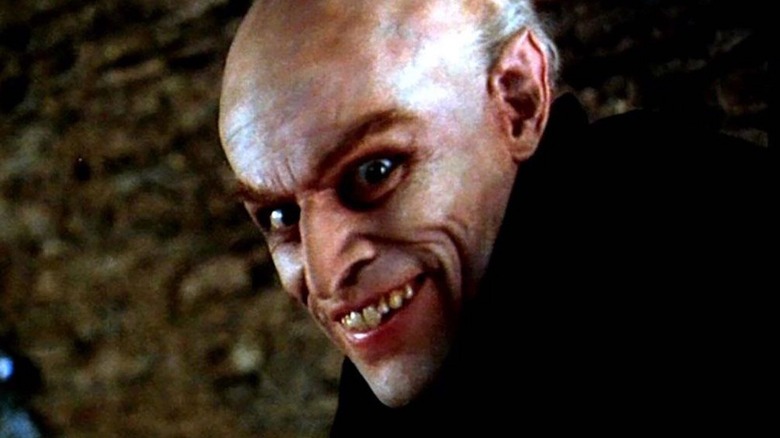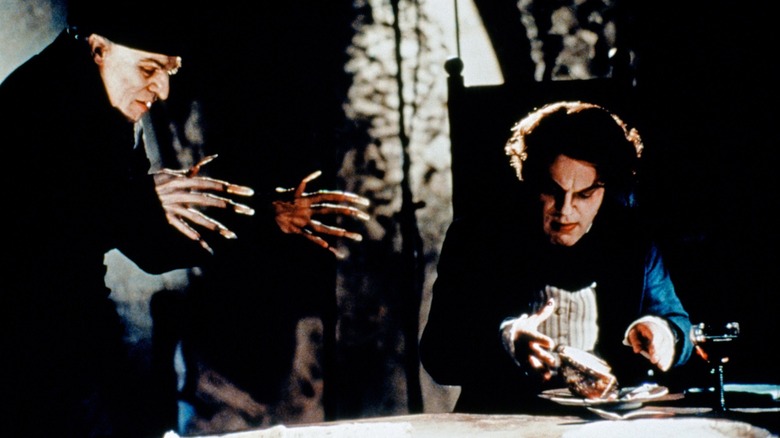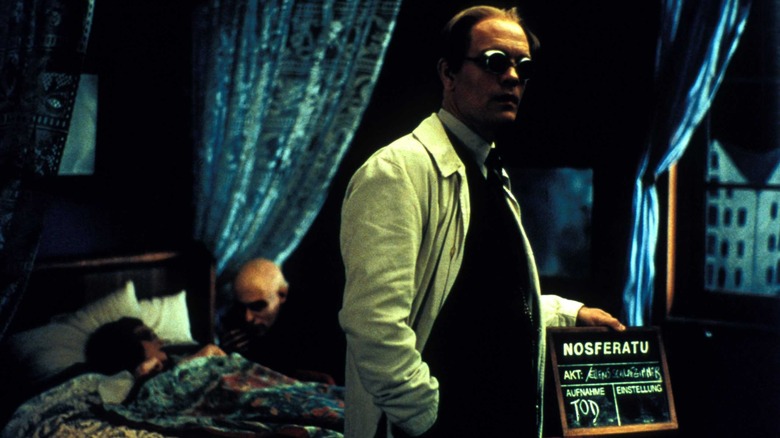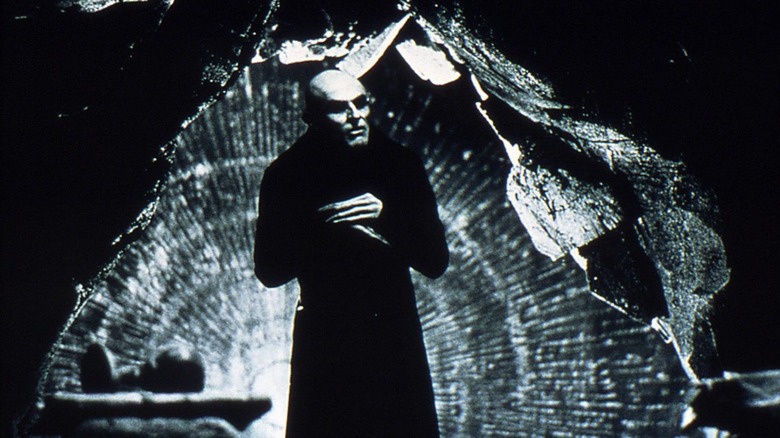Year Of The Vampire: Shadow Of The Vampire Takes Cinema Verité A Little Too Far
(Welcome to Year of the Vampire, a series examining the greatest, strangest, and sometimes overlooked vampire movies of all time in honor of "Nosferatu," which turns 100 this year.)
As we celebrate the 100th anniversary of "Nosferatu" by looking back at the great vampires of cinema, you're going to see a lot of the heavy-hitters getting the spotlight, but I'd like to take a weird vampire back alley and focus on a less traditional vampire movie. Now, this isn't one of those "monster reinvented" kinda of stories, like George Romero's "Martin," for instance. This is a true blue vampire movie, but one that takes a high concept approach.
"Shadow of the Vampire" is a 2000 film that posits ... what if Max Schreck, the star of "Nosferatu," was in fact an actual, real-life vampire? Think of it like one of those Oscar bait-y movies about making movies, except in this one a director has to wrangle an old world vampire with a thirst for the blood of his fellow cast and crew.
This is a movie that I remember being fairly well received when it came out, but for some reason just disappeared from genre conversation. I think "Shadow of the Vampire" is great, so it's not a quality thing, and the cast is absolutely top notch. Willem Dafoe plays Max Schreck, the vampire star of the movie, John Malkovich is F.W. Murnau, the famed director of "Nosferatu," and the rest of the cast is rounded out with familiar faces like the wonderfully bizarre Udo Kier, the always charming Carey Elwes, and Eddie Izzard, who at the time was most famous as a hilarious stand-up comedian, but turned in a great serious performance here.
A Horror Film For Cinephiles
I think part of the reason why "Shadow of the Vampire" has left the cultural discussion is because it has a very unique tone. It's a little bit serious horror movie, a little bit drama, and a little bit dark comedy. If this was a full-on horror comedy it would probably be a lot more famous, especially with this cast, but I don't know if it'd actually work.
Dafoe is just plain scary. We all know this and when you give him that "Nosferatu" look it would be a crime to not play up the creep factor. No, I don't see this story working in the way that "What We Do In The Shadows" does. This is a horror movie for cinephiles. There's a love of silent film and the filmmaking process, but also a friendly skewering of self-obsessed artists. "Shadow of the Vampire" is about a filmmaker willing to risk the lives of his cast and crew for the sake of authenticity, which is certainly a theme that is sadly even more relevant today than it was back in 2000.
This isn't a commentary on horror the way "Scream" is. Don't expect any meta jokes in "Shadow of the Vampire." What screenwriter Steven Katz seems more interested in is commenting on the power dynamics of a movie set. Schreck is a demanding star, but not because of ego ... at least not wholly because of ego. Schreck refuses to film scenes on a boat, instead insisting on being flown to an island location. For a non-vampire star this would be due to inconvenience or laziness, but for Schreck it's likely because vampires sometimes have trouble crossing standing water.
"If it is not in the frame, it does not exist."
There's a scene in "Shadow of the Vampire" where Murnau is berating Schreck for snacking on his director of photography, forcing him to find a replacement. In his frustration he bemoans, "Why couldn't it have been the script girl!"
Murnau is portrayed as a sociopath who is willing to do anything for his picture, an archetype for sure, but one that has been proven time and again to be true. You could take this exact structure, strip out the horror elements, and it's a movie about two giant egos clashing on a film set. On one side, a director with a god complex, on the other a selfish star. Neither are protagonists in this story, but oddly the director comes across even worse than the monster here. The monster is just doing what he does, while the director ruthlessly and with great calculation lines up his next meals so he can end up with a thrilling picture.
I think that's why this film's tone is so specific. At its heart it's a film about the artistic process — a dramatic examination of the conflated importance of storytelling that also happens to have Willem Dafoe snatching a bat out of the air and suck it dry while having a heartfelt conversation with the "Nosferatu" producers about his past.
A Wholly Unique Tone
"Shadow of the Vampire" is that odd bird film that is very well made, well-acted and has some really wonderfully scripted scenes, but just doesn't engender further engagement for whatever reason. It's a movie that I think of quite often, but very rarely revisit.
I suppose that's because it's not exactly a fun watch. It's not a crazy horror movie with wicked kills or a comedy that has me clutching my stomach like Chris Evans every time he laughs. It's also not a drama that hooks me emotionally and makes me want to come back to it time and again to safely tap into those sad feelings.
"Shadow of the Vampire" is its own unique thing, which is something to celebrate. We don't get pictures like this anymore, probably for all the reasons I listed above. A script like this would never make it through a studio or streamer vetting process these days, which is all the more reason to celebrate it.
So, while you're in a vampire kinda mood, for sure hit up the OG classics (Universal, Hammer), the neo-classics ("The Hunger," "Near Dark") and oddball titles ("Martin," "Only Lovers Left Alive"), but maybe find a little room for this black sheep films, like "Shadow of the Vampire." I think you'll like it, and at the very least it'll make a hell of a double feature with "Nosferatu."



